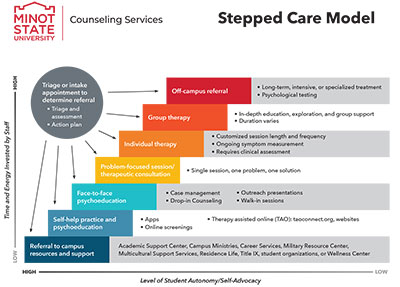Minot State implements new student mental health model

MINOT, N.D. – Minot State University is implementing a new system of delivering and monitoring mental health and mental health treatment for students, named Stepped Care.
The model is a multi-tier system of programs that seeks to meet students where they are in their mental health process while promoting autonomy and empowerment.
“The Stepped Care Model is important for Minot State University because it will help counseling services and, ultimately, the University as a whole, in responding to and streamlining student needs and requests regarding their mental health,” said Troy Roness, Minot State clinical mental health counselor. “Our plan is to provide students with opportunities for connections with other on- and off-campus resources and support, as well as an integration of services across all of campus — this is crucial for a healthy campus climate.”
The most effective, yet least resource intensive, intervention is offered first based off an individual’s needs. Services will then “step up” as required depending on the level of student desire or need.
Less intensive treatments may include campus referrals, brief consultations, and self-help approaches like self-help practices and mental health apps, while more intensive treatments encompass options such as longer-term therapy, group therapy, or an off-campus or community referral. With Stepped Care, a variety of resources for individuals and an intervention structure that promotes resilience encourages a growth mindset.
“I realize I am biased, but with this model and our incorporations of a new mental health app for students, we will have the opportunity to provide mental health resources using new technology in effective, flexible, and expedient ways,” said Roness. “We want to provide mental health services to accommodate student comfort levels and preferences.”
Implementation of the Stepped Care Model has exhibited notable effectiveness at universities across the country.
A first-year review at Calvin University, in Grand Rapids, Michigan, showed a 56% decrease in wait time for new students from their initial request to first appointment, and a 61% decrease in crisis appointments overall.
“The mental health services environment is rapidly changing, and we have a duty to keep pace with those changes — and even step ahead,” said Roness. “By taking a personalized, stepped care approach, our counselors and clinic staff hope to provide flexible access to wellness and mental health resources.
“By providing the additional options for one-time visits, consultations, education, campus support, and the fluidity of services based upon students’ needs, this model will empower our staff to help students maximize and manage their mental health without limiting services solely to long-term psychotherapy. Frankly, you cannot apply a one size fits all approach to mental health services.”
When students think about mental health care on campus, many only picture individual therapy appointments. For stepped care to be successful, counseling services have created a visual explanation of the model to help expand understanding of what mental health care can include and describe the broad array of resources available to Minot State students.
The Stepped Care Model is founded on the following beliefs:
- Students should not have to wait for mental health services.
- Different students require different levels of care.
- Finding the right level of care often depends on monitoring outcomes.
- Moving from lower to higher levels of care, based on student outcomes, often increases effectiveness of mental health services.
The goals of the Stepped Care Model at the Minot State University Student Health Clinic and Counseling Services include:
- Providing timely access to mental health care and education.
- Creating customized treatment in response to unique and specific needs of each individual student.
- Connecting students to a range of wellness and academic services and supports, both inside counseling services and across Minot State’s campus.
- Introducing students to resources, including online screenings and websites, mental health-based apps, and self-help materials.
- Increasing utilization of psychoeducational consultations.
- Increasing utilization of short-term services.
- Providing referrals to community providers.
Minot State values an environment and culture allowing each student to fully realize their potential. As part of the student affairs structure, counseling services strive to create a sense of belonging for students, parents, and guests, and exists to assist students in achieving their dreams and a degree from the University. The Student Health Clinic is comprised of a well-rounded team of individuals available to help meet those needs, including a counselor, nurse, social worker, and part-time nurse practitioner.
“Stepped care at Minot State University is a holistic approach that addresses prevention through intervention,” said Roness. “This approach helps ensure students are getting the support they need — not more, not less.”
About Minot State University
Minot State University is a public university dedicated to excellence in education, scholarship, and community engagement achieved through
rigorous academic experiences, active learning environments, commitment to public service, and a vibrant campus life.
Published: 08/08/23


